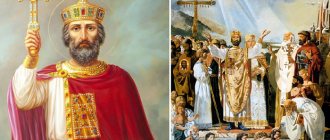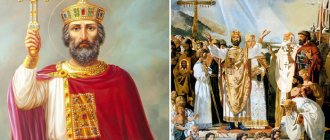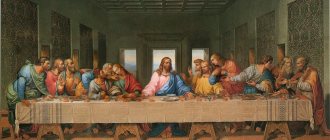It is difficult to find a religion that would so powerfully influence the fate of humanity as Christianity did. It would seem that the emergence of Christianity has been studied quite well. An unlimited amount of material has been written about this. Church authors, historians, philosophers, and representatives of biblical criticism worked in this field. This is understandable, because we were talking about the greatest phenomenon, under the influence of which modern Western civilization actually took shape. However, one of the three world religions still holds many secrets.
Emergence
The creation and development of a new world religion has a complicated history. The emergence of Christianity is shrouded in secrets, legends, assumptions and assumptions. Not much is known about the establishment of this doctrine, which today is professed by a quarter of the world's population (about 1.5 billion people). This can be explained by the fact that in Christianity, much more clearly than in Buddhism or Islam, there is a supernatural principle, belief in which usually gives rise to not only reverence, but also skepticism. Therefore, the history of the issue was subject to significant falsification by various ideologists.
In addition, the emergence of Christianity and its spread was explosive. The process was accompanied by active religious, ideological and political struggle, which significantly distorted the historical truth. Disputes on this issue continue to this day.
When do words become blasphemy?
What should we do if the conversation did take place, and offensive words were directed not only at us? If blasphemous words from the mouths of unbelievers are addressed to God, the Mother of God, the saints, as well as the Church, the Holy Sacraments, clergy, everything on which God’s grace rests, this is called blasphemy.
What should we do if we hear this? The best thing to do is to silently pray for this person and retreat. But wouldn’t this be a betrayal, a renunciation of God? After all, the Gospel says:
Everyone who confesses Me before men, I will also confess him before My Heavenly Father; and whoever denies Me before men, I will also deny him before My Father in heaven (Matthew 10:32-33)
Our confession in this case will manifest itself, first of all, in disagreement with blasphemy. It is advisable, of course, to express your position clearly. But you need to understand that any objections from an Orthodox Christian can cause additional aggression and even further provoke an argument. In a word, you need to look at the situation.
Over time, we should develop a certain spiritual intuition: when and what to say. In any case, we can object only when our words are more significant than silence. It’s worth thinking about this in advance.
Birth of the Savior
The emergence and spread of Christianity is associated with the birth, deeds, death and resurrection of just one person - Jesus Christ. The basis of the new religion was the belief in the divine Savior, whose biography is presented mainly in the Gospels - four canonical and numerous apocryphal ones.
The emergence of Christianity is described in sufficient detail in church literature. Let us briefly try to convey the main events recorded in the Gospels. They claim that in the city of Nazareth (Galilee), the Archangel Gabriel appeared to a simple girl (“virgin”) Mary and announced the upcoming birth of a son, but not from an earthly father, but from the Holy Spirit (God).
Mary gave birth to this son during the time of the Jewish king Herod and the Roman emperor Augustus in the city of Bethlehem, where she went with her husband, the carpenter Joseph, to participate in the census. The shepherds, notified by the angels, welcomed the baby, who received the name Jesus (the Greek form of the Hebrew "Yeshua", which means "God the savior", "God saves me").
By the movement of the stars in the sky, the eastern sages - the Magi - learned about this event. Following the star, they found a house and a baby, in whom they recognized Christ (“the anointed one,” “messiah”), and presented him with gifts. Then the family, saving the child from the maddened King Herod, went to Egypt, returning and settled in Nazareth.
The apocryphal Gospels tell numerous details about the life of Jesus at that time. But the canonical Gospels reflect only one episode from his childhood - a trip to Jerusalem for a holiday.
Don't be Pharisees
The greatest danger that exists in communicating with people who are far from the Church is the possibility of us exalting ourselves over them. Of course, such relationships will not bring any benefit to us, our interlocutors, or our faith. In no case should we look at non-Christians as “second-class” people, deprived of God’s grace.
Always in such cases we must remember, firstly, that Christ sacrificed Himself for everyone, without separating the righteous from sinners. Secondly, it is useful to always keep in mind the parable of the publican and the Pharisee, remembering whose prayer was more pleasing to the Lord. Another thing, of course, is that for some reason we always tend to associate ourselves with the humble publican from that story, but that’s another conversation.
And here, of course, we must not forget about sincerity. This applies to communication in general, from everyone to everyone, but it should apply even more so to an Orthodox Christian. This is not about turning out our souls, according to tradition, in front of everyone we meet, but at least we must avoid deceit in communicating with our neighbors.
You should always behave naturally and naturally, without putting on masks: neither secular people-pleasing, nor too pious piety. Moreover, in this situation, any hypocrisy will be perceived as a stone against Christianity. It would also be useful to never forget what we ourselves were like before coming to the Church. After all, most people today still join the church at a mature, conscious age.
It is often useful to remember how long we lived without God and how we came to Him. Then it becomes obvious: the fact that we ended up in the Church is not our merit, but the grace of God. In the same way, at any moment it can pour out on any of our interlocutors, even if he is the most ardent persecutor of Christians.
Acts of the Messiah
Growing up, Jesus adopted his father’s experience, became a mason and carpenter, and after Joseph’s death he fed and took care of the family. When Jesus was 30 years old, he met John the Baptist and was baptized in the Jordan River. Subsequently, he gathered 12 disciples-apostles (“envoys”) and, walking with them for 3.5 years around the cities and villages of Palestine, preached a completely new, peace-loving religion.
In the Sermon on the Mount, Jesus established moral principles that became the basis for the worldview of the new era. At the same time, he performed various miracles: he walked on water, raised the dead with the touch of his hand (three such cases are recorded in the Gospels), and healed the sick. He could also calm a storm, turn water into wine, and feed 5,000 people with “five loaves and two fishes.” However, Jesus was going through a difficult time. The emergence of Christianity is associated not only with miracles, but also with the suffering that he experienced later.
Persecution of Jesus
No one perceived Jesus as the Messiah, and his family even decided that he had “lost his temper,” that is, he had become frantic. Only during the Transfiguration did Jesus' disciples understand his greatness. But Jesus’ preaching activities irritated the high priests in charge of the Jerusalem Temple, who declared him a false messiah. After the Last Supper, which took place in Jerusalem, Jesus was betrayed by one of his disciples and followers, Judas, for 30 pieces of silver.
Jesus, like any person, in addition to divine manifestations, felt pain and fear, so he experienced the “passion” with anguish. Captured on the Mount of Olives, he was convicted by the Jewish religious court - the Sanhedrin - and sentenced to death. The sentence was confirmed by the governor of Rome, Pontius Pilate. During the reign of the Roman Emperor Tiberius, Christ was subjected to martyrdom - crucifixion. At the same time, miracles happened again: earthquakes swept through, the sun darkened, and, according to legend, “coffins opened” - some of the dead were resurrected.
Resurrection
Jesus was buried, but on the third day he rose again and soon appeared to the disciples. According to the canons, he ascended to heaven on a cloud, promising to return later to resurrect the dead, to condemn the actions of everyone at the Last Judgment, to cast sinners into hell to eternal torment, and to lift the righteous to eternal life in “mountainous” Jerusalem, the heavenly Kingdom of God. We can say that from this moment an amazing story begins - the emergence of Christianity. The believing apostles spread the new teaching throughout Asia Minor, the Mediterranean and other regions.
The founding day of the Church was the feast of the descent of the Holy Spirit on the apostles 10 days after the Ascension, thanks to which the apostles had the opportunity to preach a new teaching in all parts of the Roman Empire.
Secrets of history
How the emergence and development of Christianity proceeded at an early stage is not known for certain. We know what the authors of the Gospels—the apostles—told us about. But the Gospels differ, and significantly, regarding the interpretation of the image of Christ. In John, Jesus is God in human form, the author strongly emphasizes the divine nature, and Matthew, Mark and Luke attributed to Christ the qualities of an ordinary person.
The existing Gospels are written in Greek, a language common in the Hellenistic world, while the real Jesus and his early followers (Judeo-Christians) lived and operated in a different cultural environment, communicating in Aramaic, a language common in Palestine and the Middle East. Unfortunately, not a single Christian document in Aramaic has survived, although early Christian authors mention Gospels written in this language.
After the ascension of Jesus, the sparks of the new religion seemed to fade away, since there were no educated preachers among his followers. In fact, it happened that a new faith was established throughout the planet. According to church views, the emergence of Christianity is due to the fact that humanity, having retreated from God and carried away by the illusion of domination over the forces of nature with the help of magic, nevertheless sought the path to God. Society, having gone through a difficult path, has “ripened” to the recognition of a single creator. Scientists also tried to explain the avalanche-like spread of the new religion.
“Behold, I’m standing at the door and knocking”
What can we do if we sincerely worry about a person’s soul, wishing for it renewal and salvation in Christ? It is important not to forget here that the Lord, perhaps more than anything else in the world, respects the freedom of everyone. Even honestly unbelieving people can therefore turn out to be much closer to Him than believers under duress.
Here are the words of the Savior from the book “Revelation of John the Theologian (Apocalypse)”:
Behold, I stand at the door and knock: if anyone hears my voice and opens the door, I will come in to him and dine with him, and he with me (Rev. 3:20)
If the Lord Himself meekly and patiently stands at the door of the human heart, waiting for an answer, and does not forcefully break in, then should we really act differently? In this case, our sincere prayer to God for the soul of this person will have great power.
Spiritually experienced fathers believed that until the Lord reaches such a heart from the inside, it will be impossible for us to “storm” it from the outside. Therefore, it is better not to start a conversation about faith at all until the person himself asks or is clearly disposed to such a conversation. Otherwise, we ourselves can provoke him to blasphemy.
Prerequisites for the emergence of a new religion
Theologians and scientists have been struggling for 2000 years over the phenomenal, rapid spread of a new religion, trying to figure out these reasons. The emergence of Christianity, according to ancient sources, was recorded in the Asia Minor provinces of the Roman Empire and in Rome itself. This phenomenon was due to a number of historical factors:
- Intensifying exploitation of the peoples subjugated and enslaved by Rome.
- Defeats of the slave rebels.
- The crisis of polytheistic religions in Ancient Rome.
- Social need for a new religion.
The beliefs, ideas and ethical principles of Christianity emerged on the basis of certain social relations. In the first centuries AD, the Romans completed their conquest of the Mediterranean. By subjugating states and peoples, Rome simultaneously destroyed their independence and the originality of social life. By the way, in this respect the emergence of Christianity and Islam are somewhat similar. Only the development of two world religions took place against different historical backgrounds.
At the beginning of the 1st century, Palestine also became a province of the Roman Empire. Its inclusion in the world empire led to the integration of Jewish religious and philosophical thought from Greco-Roman thought. Numerous communities of the Jewish Diaspora in different parts of the empire also contributed to this.
Where does Christianity begin?
Saint Nikephoros the Confessor
The courageous defender of the Orthodox faith, Saint Nikephoros the Confessor, was born in Constantinople in the second half of the 8th century. Deep faith and readiness for the feat of confession were instilled in him by his parents, Theodore and Evdokia. Along with a real Christian upbringing, Saint Nicephorus also received a good secular education. Therefore, during the reign of Leo IV (775–780), the future saint became a royal adviser.
Saint Nikephoros wrote about his life choice:
“I had barely passed my youth and managed to reach manhood when I found myself in the royal palace and received a position, and not just some insignificant and insignificant one... Having served in it for some time, bound by human affairs and coming to the consciousness of the impermanence of this life, I began to reflect and to arouse in oneself thoughts about how difficult and inconvenient it is for those engaged in such service to devote themselves to the highest objects, especially if one does not find himself deprived of the best hope. And I began to consider one thing childish, and the other important - I began to say goodbye to the first, and strive for the second as best I could - and I believed that it was better to see myself succeeding in this than to be brilliant in that.”
Christianity begins from the moment it is recognized as the most serious, most important guideline in life
“I began to consider one thing childish, and the other important - I began to say goodbye to the first, and to strive for the second, to the best of my ability...” These words of the future lamp of Orthodoxy express a very deep and important thought. The thought is not abstract, not from the realm of unattainable theological heights, but completely practical and in demand for every believer. Its meaning is that Christianity begins from the moment it is recognized as the most serious, most important life guideline, based on which we will evaluate everything that happens in our lives. At the same time, the Gospel, relegated to second place or even placed on par with something very important, is unlikely to become a saving path for us.
Vasily Rozanov wrote about this property of Christianity:
“Christianity is a religion of descending progression, eternally striving and never reaching the magnitude: “Christ + 0.” In every day and in every age, in every place, in every human soul it turned out “Christ + something else,” “Christ + wealth,” “Christ + glory,” “Christ + the comforts of life.” But this “something” added to Christ always only descended and diminished in our soul as Christ prevailed... As soon as the family becomes serious, Christianity suddenly turns into a joke; As soon as Christianity is serious, family, literature, and art turn into a joke.”
Of course, we are not talking about neglecting everything. The question is the hierarchy of values. Based on what we look at everything that happens to us, what we plan, what we strive for. Saint Nicephorus speaks precisely about this. At the most crucial moment, he managed to consider salvation, Christ, the only serious thing in his life, while everything else was childish, frivolous, and transitory. In the Gospel the Savior speaks about it this way:
“Whoever loves father or mother more than Me is not worthy of Me; and whoever loves a son or daughter more than Me is not worthy of Me; and whoever does not take up his cross and follow Me is not worthy of Me. He who saves his soul will lose it; but he who loses his life for My sake will save it” (Matthew 10:37-39).
This is not a call to callousness, not cruelty. We are talking about a hierarchy of values, the only true one that can help a person find the right way out of any situation. Otherwise - hesitation, uncertainty, mistakes. Otherwise, the Word of God, considered just one of the options, becomes a judgment for us.
“I despised real glory, as if it were disappearing like a theater stage,” - this is how Saint Nikephoros testified about his life revolution.
After a long time, the firm, uncompromising position of the Holy Patriarch Nicephorus in defending the veneration of icons became the reason for his condemnation and exile. After 13 years of hardship and sorrow, on June 15, 828, the saint died in exile. And on March 13/26, 847, the incorrupt, fragrant relics of St. Nikephoros, which had lain in the ground for 19 years, were triumphantly transferred to Constantinople to the cathedral church of Hagia Sophia.
Why a new religion spread in record time
A number of researchers consider the emergence of Christianity to be a historical miracle: too many factors coincided for the rapid, “explosive” spread of a new teaching. In fact, it was of great importance that this movement absorbed broad and effective ideological material, which served it to form its own doctrine and cult.
Christianity as a world religion developed gradually under the influence of various movements and beliefs of the Eastern Mediterranean and Western Asia. Ideas were drawn from religious, literary and philosophical sources. This:
- Jewish messianism.
- Jewish sectarianism.
- Hellenistic syncretism.
- Oriental religions and cults.
- Roman folk cults.
- Cult of the Emperor.
- Mysticism.
- Philosophical ideas.
Fusion of philosophy and religion
Philosophy—skepticism, Epicureanism, Cynicism, and Stoicism—had a significant role in the emergence of Christianity. The “middle Platonism” of Philo from Alexandria also had a noticeable influence. A Jewish theologian, he actually went into the service of the Roman emperor. Through an allegorical interpretation of the Bible, Philo sought to merge the monotheism of the Jewish religion (belief in one god) and elements of Greco-Roman philosophy.
The moral teachings of the Roman Stoic philosopher and writer Seneca were no less influential. He viewed earthly life as a prelude to rebirth in the other world. Seneca considered the main thing for a person to be the acquisition of freedom of spirit through the awareness of divine necessity. This is why later researchers called Seneca the “uncle” of Christianity.
Dating problem
The emergence of Christianity is inextricably linked with the problem of dating events. An indisputable fact is that it arose in the Roman Empire at the turn of our era. But when exactly? And where in the grandiose empire that covered the entire Mediterranean, a significant part of Europe, and Asia Minor?
According to the traditional interpretation, the origin of the basic postulates dates back to the years of Jesus’ preaching activity (30-33 AD). Scholars partially agree with this, but add that the creed was compiled after the execution of Jesus. Moreover, of the four canonically recognized authors of the New Testament, only Matthew and John were disciples of Jesus Christ, were witnesses to events, that is, they were in contact with the direct source of the teaching.
Others (Mark and Luke) have already received some of the information indirectly. It is obvious that the formation of the doctrine extended over time. It `s naturally. After all, after the “revolutionary explosion of ideas” in the time of Christ, there began an evolutionary process of assimilation and development of these ideas by his disciples, who gave the teaching a completed form. This is noticeable when analyzing the New Testament, the writing of which continued until the end of the 1st century. True, there are still different datings of books: Christian tradition limits the writing of sacred texts to a period of 2-3 decades after the death of Jesus, and some researchers extend this process until the middle of the 2nd century.
What an Orthodox Christian should never do
— Andrey, the editorial office of Orthodox Life regularly receives various questions from readers. We have selected the most frequently repeated ones and would like to discuss them with you. Let's start with this question: is it possible for Orthodox Christians to enter Catholic churches and mosques? How to behave there?
— In one of his Epistles, the Holy Apostle Paul says: “Everything is permissible for me, but not everything is profitable” (1 Cor. 6:12). Consequently, in order to more correctly answer this question, it is first worth determining the very purpose of visiting a heterodox or heterodox religious building. If we go to a church or mosque to look, so to speak, to expand our cultural horizons, then, in principle, there is nothing reprehensible in this. If we visit non-Orthodox churches in order to pray, we should remember the 65th Apostolic Canon: “If anyone from the clergy or layman enters into a Jewish or heretical congregation to pray: let him be expelled from the sacred rank and excommunicated from church communion.” . But there are exceptions: in many Roman Catholic churches, as well as in churches belonging to the jurisdiction of the so-called Kyiv Patriarchate, there are shrines that are also revered by the Orthodox. The Apostolic Canon cited above refers to the prohibition of participating in PUBLIC worship together with non-Orthodox people. Therefore, there is nothing reprehensible if an Orthodox Christian prayerfully honors this or that shrine located in a non-confessional church.
Regarding how one should behave in non-Orthodox churches, the rule for leadership can be only one factor: good manners. An Orthodox Christian, wherever he is, must behave in a civilized and restrained manner. Despite our personal beliefs, we in no way have the right to offend the religious feelings of other people, because the main criterion that distinguishes a Christian is, first of all, love. And this criterion was determined by our Lord Jesus Christ Himself: “By this everyone will know that you are My disciples, if you have love for one another” (John 13:35).
— Is it possible to turn to alternative medicine, for example Chinese?
— The Orthodox Church has never considered achievements in the field of medicine to be a spiritual obstacle. But before resorting to the help of one or another “alternative doctor”, a person must understand for himself: what sources he uses, otherwise he can cause considerable harm to both his body and his soul.
One of the researchers of alternative methods of treatment once remarked: the Chinese, for example, treat their medicine as a religion. Such an attitude towards medicine should alert an Orthodox person, because nothing can be higher and more sacred than religion. In addition, German scientists, studying the practice of acupuncture, conducted the following experiment: some patients were given needles, so to speak, according to all the “canons” of Chinese medicine, while others, roughly speaking, were given at random, just so as not to touch important organs and cause harm. As a result, the effectiveness of the first acupuncture was 52%, and the second - 49%! That is, there was practically no difference between “smart” and “free” acupuncture.
However, a more pressing issue is the use of some kind of spiritual practice in medicine. So, for example, some “healers”, in order to cure this or that ailment, suggest that their patients try to leave the physical world into the supersensible, extrasensory world. But we must remember that our physical body is a kind of barrier that separates us from direct direct communication with the spiritual world and, in particular, the world of fallen spirits. Some Eastern cults use a whole set of exercises that promote such an exit into the “spiritual world,” and this practice weakens our protection from demons. Saint Ignatius of Caucasus warns: “If we were in sensual communication with demons, then in the shortest possible time they would completely corrupt people, constantly instilling evil in them, clearly and incessantly promoting evil, infecting them with examples of their constant criminal and hostile activities to God.”
That is why any “alternative medicine”, practicing some kind of communication with the spiritual world, even if it promises its patients physical recovery, ultimately becomes dangerous for their spiritual health.
-What does it mean not to go to the council of the wicked?
— The meaning of this verse, which is the first verse of the first psalm of the Book of Psalms, is very deep and multifaceted. Thus, St. Athanasius the Great says: “the council of the wicked” is a meeting of evil people who seek to divert the righteous from following the path of God. And St. Basil the Great clarifies: “the advice of the wicked” is all sorts of wicked thoughts that, like invisible enemies, overcome a person.
In addition, it is very interesting that in the above psalm about the opposition of the righteous to the “council of the wicked” it is said “in three dimensions” - walking, standing and sitting: “Blessed is the man who does not walk in the advice of the wicked, and does not stand in the path of sinners, and the seats of the destroyers are not seated.” According to St. Theophan the Recluse, the purpose of such a threefold indication is to warn against the three main degrees of deviation into evil: in the form of an internal attraction to evil (march towards sin), in the form of confirmation in evil (standing in sin) and in the form of a fight against good and propaganda evil (collaboration with the destroyer, that is, the devil).
Thus, going to the council of the wicked is all kinds of participation in evil, be it in thought, word or deed. According to the Monk John Cassian the Roman, in order to be saved, a person must constantly control himself, practicing spiritual activity: without this there will be no spiritual life.
— Is it possible to go on vacation, for example, to a ski resort during the Nativity Fast?
— According to the Venerable Ephraim the Syrian, the purpose of fasting is so that a person can overcome lusts, vices and sins. If fasting does not help us overcome sin, we must think: how are we fasting, what are we doing wrong?
Unfortunately, historically it has happened that in the life of a modern person, most of the vacations occur during the Nativity Fast - during the New Year holidays. The purpose of the Nativity Fast is to prepare a person to accept the Divine Infant Christ, who comes into this world and becomes a man with the goal of saving each of us from the power of sin and death. And therefore, the main thing that an Orthodox Christian should think about on the eve of Christmas is how best, most correctly, to prepare himself to meet the Savior.
Active recreation, such as skiing, is very beneficial for health if it is combined with a person’s spiritual growth. Otherwise, there will be no benefit from such “recovery”. Therefore, if our rest does not allow us to make our heart a worthy receptacle for the Living God, it is better to refuse such rest.
— Is it possible to give a tattoo to a woman, for example, for cosmetic purposes?
- In order to answer this question, you need to decide: why is such a tattoo needed at all, what are the reasons that motivate a person to make certain images on his body?
Even in the Old Testament it was said: “For the sake of the dead, do not make any cuts in your flesh or write on yourselves” (Lev. 19:28). This prohibition in the Pentateuch of Moses is repeated twice more: in the same Book of Leviticus (21:5), as well as in the Book of Deuteronomy (14:1). Moses forbids disfiguring the human body, since such an action is an insult to the Creator, who gave man beautiful flesh. Historically, a tattoo is a sign of belonging to a pagan cult: people, with the help of tattoos, hoped to gain special favor from one or another deity. That is why, since ancient times, tattoos have been “an abomination to the Lord.”
According to Metropolitan Anthony of Sourozh, the body is the visible part of the soul, therefore any external change is, first of all, a sign of internal, spiritual changes occurring in a person. The main signs of a Christian are modesty, meekness and humility. A tattoo, according to one modern author, is an escape from modesty, an attempt to present oneself more elegantly and, perhaps, with the aim of somehow seducing others. Based on this, we can confidently conclude: even the most seemingly harmless tattoos can cause irreparable spiritual harm to a person.
— Is it possible to listen to the prayer rule on headphones on the way to work or using a CD in the car?
— Prayer is, first of all, a conversation with God. And therefore, the assertion that you can pray while listening to an audio recording seems very doubtful.
Unfortunately, modern man, who has simplified his life so much with the help of certain technologies, is ready to devote less and less time to God and communication with Him. That’s why we try to pray with audio recordings, listening to evening and morning prayers in the car or on the way home. But if you think about it: how carefully can we listen to such recordings? How focused can we pray to them?
The Holy Fathers always said: it is better to sincerely say a few words to God than to say long prayers without thinking about Him. The Lord does not need our words, but our heart. And He sees its contents: the desire for one’s Creator and Savior, or an attempt to brush aside Him, hiding behind a half-hour audio recording.
—What should an Orthodox Christian never do?
— An Orthodox Christian must first of all be afraid of sinning, but not out of fear of God’s punishment. The Monk Abba Dorotheos says: the fear of God is not at all the fear of God as some kind of avenger of sins; the fear of God is the fear of offending the love of God revealed in Christ. Therefore, every Orthodox Christian should try to control himself, suppressing even the very thoughts of committing a sin, because with our sins, according to the word of the holy Apostle Paul, we again crucify our Lord Jesus Christ. By sins we destroy everything that God has done for our own salvation. And this is exactly what we should fear and avoid in our lives.
Interviewed by Natalya Goroshkova
https://pravlife.org/content/chego-nikogda-ne-dolzhen-delat-pravoslavnyy-hristianin
The emergence of Christianity in Rus'
Historically, it is known that the teachings of Christ spread in Eastern Europe in the 9th century. The new ideology came to Rus' not from any single center, but through different channels:
- from the Black Sea region (Byzantium, Chersonesus);
- because of the Varangian (Baltic) Sea;
- along the Danube.
Archaeologists testify that certain groups of Russians were baptized already in the 9th century, and not in the 10th century, when Vladimir baptized the people of Kiev in the river. Before Kyiv, Chersonesus was baptized - a Greek colony in Crimea, with which the Slavs maintained close ties. Contacts of the Slavic peoples with the population of ancient Tauris constantly expanded with the development of economic relations. The population constantly participated not only in the material, but also in the spiritual life of the colonies, where the first exiles, Christians, were sent into exile.
Also possible intermediaries in the penetration of religion into the East Slavic lands could be the Goths, moving from the shores of the Baltic to the Black Sea. Among them, in the 4th century, Christianity in the form of Arianism was spread by Bishop Ulfilas, who translated the Bible into Gothic. Bulgarian linguist V. Georgiev suggests that the Proto-Slavic words “church”, “cross”, “Lord” were probably inherited from the Gothic language.
The third path is the Danube path, which is associated with the enlighteners Cyril and Methodius. The main leitmotif of the Cyril and Methodius teaching was the synthesis of the achievements of Eastern and Western Christianity on the basis of Proto-Slavic culture. Enlighteners created the original Slavic alphabet and translated liturgical and canonical texts. That is, Cyril and Methodius laid the foundations of the church organization in our lands.
The official date of the baptism of Rus' is considered to be 988, when Prince Vladimir I Svyatoslavovich baptized the inhabitants of Kyiv en masse.
Should you always turn your right cheek?
Next, the question arises: what to do when harsh words are addressed to us personally? Do you always need to turn the proverbial right cheek when you hit your left? Oddly enough, the answer is likely to be negative. And in this case, too, you need to look at the situation.
Although, following the teachings of Christ, we consider meekness and humility to be the main qualities in communicating with people, but sometimes an Orthodox Christian must be able to stand up for himself. Based on the position that every person, including ourselves, is the image of God. You also need to love him in yourself and should not be allowed to humiliate him.
Meekness and humility do not mean cowardice, they are the opposite of it. Meekness and humility are great spiritual strength, and cowardice is weakness. The main thing is that we must understand why we responded to the offense: out of pride or out of a feeling of deep inner righteousness. In the second case, our answer will indeed sound meek and humble, and not irritable. The main indicator of rightness is inner calm, peace in the soul.











